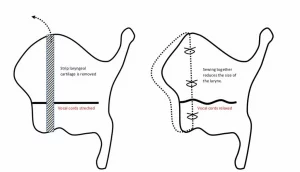The most common mistakes people make when trying to feminise or deepen their voice are forcing pitch changes, neglecting resonance, and practising without professional guidance. These habits can lead to strain and prevent a natural sound.
Voice change involves more than adjusting pitch — it’s about retraining communication style, rhythm, and tone safely and consistently.
Is Focusing Only on Pitch a Mistake in Voice Training?
Yes. Focusing only on pitch is one of the biggest mistakes in voice feminisation or deepening. A high pitch alone does not create a feminine voice, and a low pitch alone does not make a voice sound masculine.
Successful training combines pitch control with resonance placement, tone variation, and speech rhythm to produce a genuine, comfortable sound.
For Voice Doctors In London, Contact Nick Hamilton Today on 020 7034 6053
Can Poor Technique Damage the Voice?
Yes. Forcing the voice into an unnatural range or using throat tension can cause strain, hoarseness, and fatigue. Without guidance, you risk developing poor habits that make your voice sound unnatural or even painful to produce.
About 43% of clients seeking voice therapy had developed unhealthy techniques before professional intervention, highlighting the value of expert guidance early on.
Why Is Resonance Often Overlooked During Voice Practice?
Resonance determines where your sound vibrates — in the chest, throat, or head. Ignoring resonance leads to imbalance. For example, chest-heavy speech can sound dull or forced, while excessive head resonance can sound thin or artificial.
Therapy helps you find a balanced resonance that matches your gender identity and speaking style naturally.
How Important Is Consistency When Practising Voice Change?
Consistency is essential. Irregular practice confuses muscle memory, causing inconsistent results. Practising daily for short periods is more effective than long, infrequent sessions.
Gradual, focused work helps build strong habits that make your new voice effortless and stable.
What’s the Best Way to Avoid Common Mistakes in Voice Training?
The best way to avoid mistakes is to work with a qualified voice specialist. They’ll assess your current habits, design safe exercises, and monitor your progress closely. Guidance ensures your voice develops naturally without strain or frustration.
Voice change should be a gradual, empowering process — never painful or rushed.
For professional voice feminisation or deepening therapy in London, contact Nick Hamilton today on 020 7034 6053 to begin your personalised training.
See Also:




